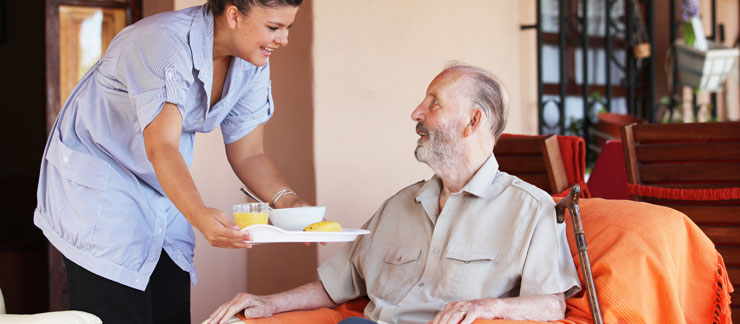
How Home Care Changes for Loved Ones Following a Stroke
After surviving a stroke, your elderly loved one has a different set of care priorities. Maybe your mom or dad has lost mobility after being partially paralyzed, and the need for your assistance has spiked considerably. At first, perhaps you were only needed for basic needs like grocery shopping. But after a stroke, your aging senior requires more intensive support. He or she may need help with personal care like bathing and grooming. And as you manage your own household and career, caring for Mom or Dad can quickly get out of hand.
Care for a Stroke Survivor
In a healthy brain, blood flow delivers oxygen to its cells. But during a stroke, the brain’s blood supply gets temporarily cut off. The shutdown causes vital brain cells to die. The brain damage leads to loss of control over memory and muscle movements.
Your elderly stroke survivor faces many physical and mental challenges. Depending on the severity of the brain damage, your loved one will have minor to significant mobility and cognitive issues. Immediately after a stroke, the survivor may endure:
- weakness in an arm or leg
- memory loss
- partial paralysis of the face
- difficulty or loss of ability to speak
- paralysis to one side of the body
Be prepared to provide extensive care for your recovering loved one. Care in the aftermath of stroke can quickly become much harder than you think. You will have to plan the logistics for your senior's basic routines. The stroke survivor may need help with everyday activity: showering, dressing, eating, bathroom breaks, basic communication. He or she quickly becomes utterly dependent on you. Meantime, as difficult as it may be, you must be prepared should your elderly loved one remain permanently impaired.
According to the National Stroke Association, some people recover completely from strokes, but more than 2/3 of survivors will have some type of disability.
One family caregiver won’t be enough to take care of the stroke survivor in the long-term. After a stroke, your loved one needs a care plan that’s sustainable, because burnout can interfere with your own life. The National Center on Caregiving states: "...most caregivers are ill-prepared for their role and provide care with little or no support, yet more than one-third of caregivers continue to provide intense care to others while suffering from poor health themselves.”
You Must Reduce the Chance of Hospital Readmission
The first month after hospital discharge is critical. It’s time to focus on stabilization, so your loved one doesn’t go back. “Among seniors on Medicare, roughly 20 percent of discharged patients end up back in the hospital within 30 days of being sent home. Elderly adults have a much lower chance of recovery if they are re-hospitalized in this 30-day window, which is why reducing hospital readmissions is so important.”
Your elderly loved one wants to stay in the comfort of the home and age in place, but the road to recovery can be daunting. Because of the physical changes that occur in the brain after a stroke, survivors may experience increased levels of anxiety, anger and depression. And you may not be equipped to deal with the intense negative emotions afflicting your stroke survivor, making an already difficult task much harder.
When the responsibility for your loved one has fallen on your shoulders, there are essential things you should know:
- Recovery for a stroke survivor is a lifelong process. It’s a myth to think the survivor will make a rapid recovery, per the National Stroke Association.
- Stroke ranks fifth as the leading cause of death in the U.S. and is a significant cause of severe disability for adults, according to the Centers for Disease Control and Prevention.
- Up to 80 percent of strokes are preventable.
The care decisions you make for your elderly loved one will determine the trajectory of the healing process. But what’s most important here is the grim reality. When your senior loved one has a stroke, the need for constant care can radically intensify.
Help to Prevent Another Stroke
When your loved one has suffered a stroke, professional home care service can be an enormous help. A professional caregiver can fill in the gaps for daily personal care. Without hygiene assistance, your senior stroke survivor may remain less able to bathe or get dressed properly. But a trained professional has the skills to restore dignity to daily self-care for your recovering senior.
“Home care complements existing health care services, alleviating pressure on the overall system, allowing more traditional models of care to work and do what they do best,” according to a joint report by the Home Care Association of America and Global Coalition on Aging.
Should the stroke survivor show symptoms of a health issue, you will be promptly notified. The professional caregiver performs only non-medical duties; however, the skilled assistant can be the first to notice signs that something is wrong and call for help. It's peace of mind you can't get any other way, especially considering the heightened difficulty of your loved one's care.
The help a home care provider offers goes beyond physical tasks, too. For example, after a stroke, your elderly loved one may have more difficulty speaking because of facial paralysis. During this time, it’s helpful to show the stroke survivor ways to stay connected. An experienced caregiver can practice online social skills with your senior to help him stay connected.
Now that you know the benefits of a professional caregiver, it’s time to share with your elderly loved one. And if you feel worried that he or she may resist outside help, don’t get discouraged. Start off with an open, casual discussion.
Click here for some useful conversation starters.
